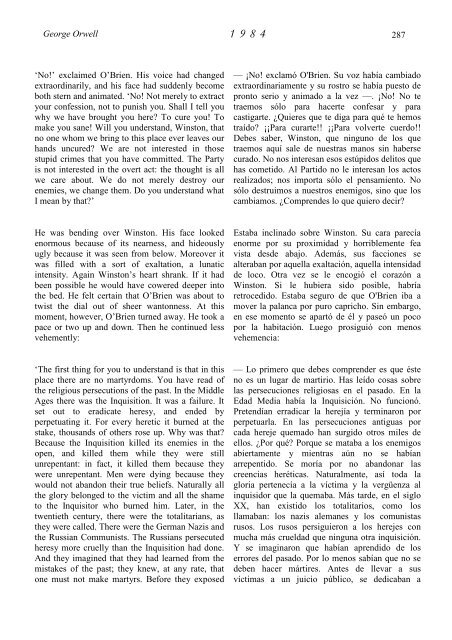You also want an ePaper? Increase the reach of your titles
YUMPU automatically turns print PDFs into web optimized ePapers that Google loves.
George Orwell 1 9 8 4<br />
‘No!’ exclaimed O’Brien. His voice had changed<br />
extraordinarily, and his face had suddenly become<br />
both stern and animated. ‘No! Not merely to extract<br />
your confession, not to punish you. Shall I tell you<br />
why we have brought you here? To cure you! To<br />
make you sane! Will you understand, Winston, that<br />
no one whom we bring to this place ever leaves our<br />
hands uncured? We are not interested in those<br />
stupid crimes that you have committed. The Party<br />
is not interested in the overt act: the thought is all<br />
we care about. We do not merely destroy our<br />
enemies, we change them. Do you understand what<br />
I mean by that?’<br />
He was bending over Winston. His face looked<br />
enormous because of its nearness, and hideously<br />
ugly because it was seen from below. Moreover it<br />
was filled with a sort of exaltation, a lunatic<br />
intensity. Again Winston’s heart shrank. If it had<br />
been possible he would have cowered deeper into<br />
the bed. He felt certain that O’Brien was about to<br />
twist the dial out of sheer wantonness. At this<br />
moment, however, O’Brien turned away. He took a<br />
pace or two up and down. Then he continued less<br />
vehemently:<br />
‘The first thing for you to understand is that in this<br />
place there are no martyrdoms. You have read of<br />
the religious persecutions of the past. In the Middle<br />
Ages there was the Inquisition. It was a failure. It<br />
set out to eradicate heresy, and ended by<br />
perpetuating it. For every heretic it burned at the<br />
stake, thousands of others rose up. Why was that?<br />
Because the Inquisition killed its enemies in the<br />
open, and killed them while they were still<br />
unrepentant: in fact, it killed them because they<br />
were unrepentant. Men were dying because they<br />
would not abandon their true beliefs. Naturally all<br />
the glory belonged to the victim and all the shame<br />
to the Inquisitor who burned him. Later, in the<br />
twentieth century, there were the totalitarians, as<br />
they were called. There were the German Nazis and<br />
the Russian Communists. The Russians persecuted<br />
heresy more cruelly than the Inquisition had done.<br />
And they imagined that they had learned from the<br />
mistakes of the past; they knew, at any rate, that<br />
one must not make martyrs. Before they exposed<br />
287<br />
— ¡No! exclamó O'Brien. Su voz había cambiado<br />
extraordinariamente y su rostro se había puesto de<br />
pronto serio y animado a la vez —. ¡No! No te<br />
traemos sólo para hacerte confesar y para<br />
castigarte. ¿Quieres que te diga para qué te hemos<br />
traído? ¡¡Para curarte!! ¡¡Para volverte cuerdo!!<br />
Debes saber, Winston, que ninguno de los que<br />
traemos aquí sale de nuestras manos sin haberse<br />
curado. No nos interesan esos estúpidos delitos que<br />
has cometido. Al Partido no le interesan los actos<br />
realizados; nos importa sólo el pensamiento. No<br />
sólo destruimos a nuestros enemigos, sino que los<br />
cambiamos. ¿Comprendes lo que quiero decir?<br />
Estaba inclinado sobre Winston. Su cara parecía<br />
enorme por su proximidad y horriblemente fea<br />
vista desde abajo. Además, sus facciones se<br />
alteraban por aquella exaltación, aquella intensidad<br />
de loco. Otra vez se le encogió el corazón a<br />
Winston. Si le hubiera sido posible, habría<br />
retrocedido. Estaba seguro de que O'Brien iba a<br />
mover la palanca por puro capricho. Sin embargo,<br />
en ese momento se apartó de él y paseó un poco<br />
por la habitación. Luego prosiguió con menos<br />
vehemencia:<br />
— Lo primero que debes comprender es que éste<br />
no es un lugar de martirio. Has leído cosas sobre<br />
las persecuciones religiosas en el pasado. En la<br />
Edad Media había la Inquisición. No funcionó.<br />
Pretendían erradicar la herejía y terminaron por<br />
perpetuarla. En las persecuciones antiguas por<br />
cada hereje quemado han surgido otros miles de<br />
ellos. ¿Por qué? Porque se mataba a los enemigos<br />
abiertamente y mientras aún no se habían<br />
arrepentido. Se moría por no abandonar las<br />
creencias heréticas. Naturalmente, así toda la<br />
gloria pertenecía a la víctima y la vergüenza al<br />
inquisidor que la quemaba. Más tarde, en el siglo<br />
XX, han existido los totalitarios, como los<br />
llamaban: los nazis alemanes y los comunistas<br />
rusos. Los rusos persiguieron a los herejes con<br />
mucha más crueldad que ninguna otra inquisición.<br />
Y se imaginaron que habían aprendido de los<br />
errores del pasado. Por lo menos sabían que no se<br />
deben hacer mártires. Antes de llevar a sus<br />
víctimas a un juicio público, se dedicaban a


